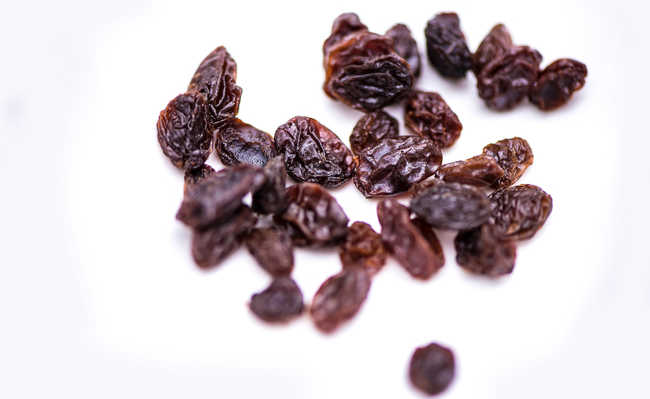What are the benefits of raisins?
Raisins are energy foods rich in fiber, vitamins and minerals

Edited and resized image of Erda Estremera, is available on Unsplash
Raisin, which can be found in black, yellow, brown and purple versions, is the fruit of the vine that has been dried in the sun or in a food dehydrator. Raisins are widely used in salads, cakes, breads, yogurts, granola and cereals. Despite its small size, raisins are a very energetic food, rich in fiber, vitamins and minerals.
- Fiber-rich foods fight diabetes and high cholesterol
Raisins are naturally sweet and rich in sugar and calories, with health benefits when consumed in moderation. Raisins can aid digestion, increase iron levels and keep bones strong.
There are several factors to consider about the nutritional benefits of raisins. Check out:
sugar and calories
Half a cup of raisins has about 217 calories and 47 grams of sugar. In comparison, a can of soda has about 150 calories and 33 grams of sugar, depending on the brand. For this reason, raisins are not exactly a low-calorie or low-sugar food.- Coconut Sugar: Good Guy or More of the Same?
High amounts of sugar and calories are typical of dried fruit, which is why keeping an eye on how many raisins you're eating at once is critical.
One study found raisins to be as effective as a brand of sports jelly beans in improving the performance of athletes who engage in moderate to high-intensity resistance exercise.
Fiber
Half a cup of raisins provides 3.3 grams of fiber, or about 10 to 24% of daily needs, depending on age and gender. Fiber, in addition to increasing satiety, helps in the digestion process, as it softens and increases the weight and size of the stool. Bulky stools are easier to pass and help prevent constipation.
- What is constipation?
Iron
Raisins are a good source of iron. Half a cup of raisins contains 1.3 milligrams of iron. That's about 7% of the recommended daily amount for most adult women and 16% for adult men.
- Iron: importance and impacts of its extraction
- Iron deficiency anemia: what it is and what are its symptoms
calcium and boron
Half a cup of raisins has about 45 milligrams of calcium. This translates to about 4% of daily needs. Calcium is essential for strong, healthy bones and teeth.
Raisins are a great ally for menopausal women, as calcium helps prevent the development of osteoporosis, a disorder characterized by bone loss that often occurs with age.
Raisins also contain a lot of the element boron, which works with vitamin D and calcium to keep bones and joints healthy, playing an important role in the treatment of osteoporosis.
- Menopause: symptoms, effects and causes
- Menopause teas: alternatives for symptom relief
- Vitamin D: what is it for and benefits
Antioxidants
Raisins are an exceptional source of natural chemicals called phytonutrients, such as phenols and polyphenols. These types of nutrients are considered antioxidants.
- Antioxidants: what are they and in what foods to find them
- What are free radicals?
Antioxidants help remove free radicals from the blood and can prevent cell and DNA damage. This can lead to illnesses such as cancer, heart disease and stroke.
Antimicrobial compounds
One study concluded that raisins contain phytochemicals that can be good for healthy teeth and gums. The phytochemicals in raisins, including oleanolic acid, linoleic acid and linolenic acid, fight bacteria in the mouth that lead to cavities.
- Gingivitis: what it is and how to treat it
In other words, eating raisins instead of sugary snacks can really help keep your smile healthy.
Adapted from Jacquelyn Cafasso










